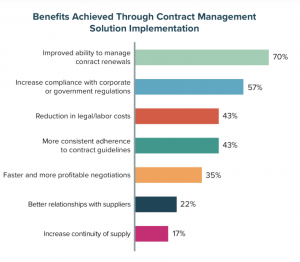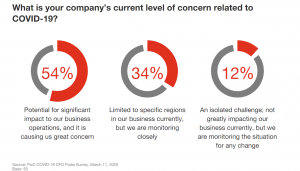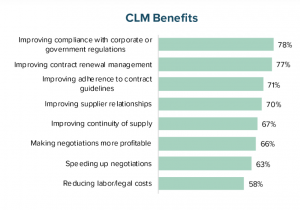Covid-19 has brought about a lot of change in a very short space of time. As we grapple to establish a new type of normal, most of us didn’t realize the extent of the impact the virus would have on our daily lives, businesses, and the wider economy.
Depending on your industry, you could now be making decisions to downsize or rapidly increase your contract portfolio. In either case, you should be aware of force majeure clauses and termination penalties within your contracts.
We have already seen force majeure clauses come into play in relation to Covid-19, with the Chinese government providing certificates to relieve suppliers and organizations of their contractual agreements. However, international law firm Holman Fenwick Willan explained to CNBC, that these certificates may not hold up internationally. Which brings us to what is a force majeure clause and how does Covid-19 impact it?
What is a Force Majeure clause?
Force Majeure meaning “superior force”, is an unforeseen circumstance that prevents or makes it impossible for a party to complete their contractual agreement. Typically, in commercial contracts, each party would include a specific list of events that would allow a force majeure clause to be imposed to excuse a delay or permit the party to cancel the contract. These can be occurrences such as war, famine, earthquakes, floods, and epidemics.
Does Covid-19 qualify?
The World Health Organization (WHO) recognized Covid-19 as a pandemic and this fact significantly impacts force majeure clauses. Since the outbreak of Foot and Mouth in 2001, references to pandemics have increased within force majeure clauses according to the law firm, Arthur Cox.
However, whether or not the force majeure clause will be accepted will be determined on the provisions of the contract and ultimately, if parties disagree, it will be down to a judge’s interpretation.
In the US, the construe of the clause will vary depending on each states’ law surrounding force majeure. However, law firm, Baker McKenzie explained although jurisdictions will vary in their treatment of the clause, it is safe to assume that the vast majority of courts in the US rely on the plain language in force majeure clauses to determine the ruling.
Turning to the UK, although force majeure is within most commercial contracts, it doesn’t have an automatic application in English law. Therefore, the Law Gazette advises companies to seek legal clarification as force majeure has no legal meaning outside of the drafting of that provision within the contract.
The lines continue to be blurred in Ireland, as Arthur Cox explains that “a force majeure event must not have been foreseen by the parties” and in light of the pandemic starting in China and the SARS outbreak in 2002, it could be argued that companies knew that Covid-19 would impact their agreement. However, like other countries, it will be down to the details within the term to see if the clause can be applied, and if the parties disagree, a judge will decide.
Now we know what it is and how it plays a role in Covid-19, let’s evaluate four fundamental aspects of a Contract Management solution and how it can help you to rapidly isolate and identify contracts that contain the clause and assess the details to react quickly, but also to prevent revenue leakage and compliance issues during this time of uncertainty.
Put an end to Surprise Renewals
If you’re reviewing the provisions of your contracts in a bid to look for new conditions or aiming to delay or cancel a contract based on the force majeure clause, the last thing you need is a contract slipping through the cracks and auto-renewing.
Auto-renewals or ‘evergreen clauses’ are one of the quickest ways to leak company revenue and it often gets missed in organizations that are reliant on manual processes. There’s also the added complexity of different deadline dates which allow for cancellation or a change to the contract without any difficulty or penalties. In manual systems, these are usually laid out in complex excel sheets, and juggling all these variables can often lead to contracts being auto-renewed before someone has had the time to review them and agree on the next steps.
However, there is a solution that retires the exhausting excel sheets and allows you time to assess each contract before its renewal. Automating Contract Management means that you will be notified at a customized time before the contract comes up for renewal, which gives business leaders ample opportunity to weigh up the contract, negotiate and analyze the vendors’ performance. It will also give you the flexibility to factor in different renewal timelines for each vendor, so whether it’s 60 or 30 days before the auto-renewal, you won’t be caught out.

The proof is in the pudding, as a Levvel report showed that organizations that implemented a Contract Management solution saw a 70% improvement in the management of auto-renewals. In a time when you’re closely inspecting your supply chain and possibly evaluating force majeure clauses, you need tools that work with you to prevent wasting time and precious resources.
Visibility into Operations
Visibility into your contracts, and in particular the provisions surrounding a force majeure or termination clause, has grown in importance as lockdown and disruptions are set to continue.
Senior leaders now need complete control and an overview of their operations. A PWC survey shows that more than half of organizations are greatly concerned with the impact Covid-19 could have on their operations and another 34% are limited to a specific region.

Organizations with Contract Management automation will be able to ease their concerns by having a very clear picture of their contract portfolio. This allows them to respond to the market and make decisions about their business operations by having easy access to fundamental details within contracts such as force majeure clauses or termination terms.
This visibility will also allow management to closely monitor operations on an on-going basis, so if they are currently confined to a region, they can react rapidly to up or downscale their contracts with vendors depending on Covid-19 developments, which will influence demand in a very short period of time.
In such an unpredictable time, being able to make decisions quickly and identify problems within your operations will give your company an advantage to minimize losses and manage cash flow effectively. For more about cash flow management, read this blog.
Eliminate External Risk
In such uncertain and unstable times, this isn’t the time to leave yourself open to risk. Covid-19 has shaken up industries. Price adjustments, limitation and exclusions clauses, and change of law clauses have now made Contract Management a minefield for compliance. As previously mentioned, even if you have a force majeure clause within a contract, you aren’t guaranteed that an excuse of delay or cancellation will be accepted by the other party, or if escalated, by a judge.
In a manual system, trying to grasp so many moving parts in such a short space of time can be overwhelming. Even before the Covid-19 outbreak, most organizations signaled the difficulty they had with government, corporate and legal compliance, according to Levvel research. If you are found to be in breach of contract or GDPR regulations, it can not only damage your reputation but a lawsuit could result in significant fines.

However, automation provided 78% of companies with improved compliance in those areas and even adherence to contract guidelines saw an increase. Most organizations are trying to implement new strategies as efficiently as possible to remain sustainable during this crisis, and having a Contract Management solution means that you’ll be confident that you’re reducing the risk of compliance issues.
Risk isn’t just external, which brings us to our next consideration, internal security in Contract Management.
Increase Internal Security
Isolating contracts that aren’t a priority to your business and where the force majeure clause is a valid reason to postpone or end a contract requires teamwork within your organization. Working from home has added another layer of complexity to an already challenging task.
Those relying on printing, scanning, amending and sending contracts over email are really going to struggle in this new environment. Even before the outbreak, manual systems risked contracts being lost or misplaced because of their paper format meant they could be left on someone’s desk and forgotten about. For more information risk and manual processes in Contract Management, read this blog.
Now, the contracts are on the move and people must use the tools they have at home to get contracts over the line or amend conditions. Different versions over email threads can get confusing and frustrating for everyone, particularly when time is of the essence. It also doesn’t protect the contract and private information being shared with people who shouldn’t have the authority to make corrections, ultimately leaving your organization open to the risk of making costly mistakes.
Organizations that have a Contract Management solution in place benefit from that internal security. Limitations on editing and viewing contracts can be put in place, a budget can also be allotted against a contract, to eliminate any nasty surprises. Approval routes can be established so the right people are seeing the final agreed version with no confusion, saving precious time and eliminating risk.
This allows senior leaders to pull out contracts that they want to change the conditions of, in light of the current climate. It also allows them to identify contracts that need to be delayed under the force majeure clause without any confusion to which version they are looking at and where the final agreed version of the contract is being stored.
Covid-19 is rapidly changing the business landscape, which includes the usage of the force majeure clause. Although your success of implementing the clause will depend on the detail, a Contract Management solution will aid you in the process of finding which contracts this applies to, efficiently reviewing them, reducing the risk of compliance issues and stopping any costly revenue leaks when you’re trying your best to keep costs to a minimum. As we navigate these unchartered waters, technology can help us find our way and maintain sustainability through such trying times. A Contract Management solution will help you gain visibility, have control over your auto-renewals and tighten up your security, so you can keep your focus on assessing the force majeure clause or termination penalties.


